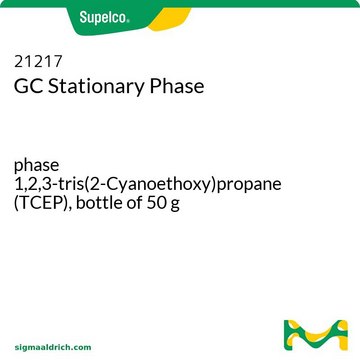21123
GC Stationary Phase
phase Triton X-100, bottle of 50 g
About This Item
Recommended Products
description
non-ionic
Quality Level
form
liquid
packaging
bottle of 50 g
parameter
temp. range at 0-200 °C
technique(s)
gas chromatography (GC): suitable
matrix active group
Triton X-100 phase
solubility
acetone: soluble
column type
packed GC
Looking for similar products? Visit Product Comparison Guide
1 of 4
This Item | 21028 | 21217 | 21104 |
|---|---|---|---|
| parameter temp. range at 0-200 °C | parameter 50-175 °C temp. range | parameter 0-175 °C temp. range | parameter 100-350 °C temp. range |
| column type packed GC | column type packed GC | column type packed GC | column type packed GC |
| technique(s) gas chromatography (GC): suitable | technique(s) gas chromatography (GC): suitable | technique(s) gas chromatography (GC): suitable | technique(s) gas chromatography (GC): suitable |
| description non-ionic | description - | description - | description - |
| form liquid | form - | form - | form - |
General description
Signal Word
Danger
Hazard Statements
Precautionary Statements
Hazard Classifications
Acute Tox. 4 Oral - Aquatic Acute 1 - Aquatic Chronic 1 - Eye Dam. 1 - Skin Irrit. 2
Storage Class Code
10 - Combustible liquids
WGK
WGK 2
Flash Point(F)
483.8 °F - closed cup
Flash Point(C)
251 °C - closed cup
Personal Protective Equipment
Choose from one of the most recent versions:
Certificates of Analysis (COA)
Sorry, we don't have COAs for this product available online at this time.
If you need assistance, please contact Customer Support.
Already Own This Product?
Find documentation for the products that you have recently purchased in the Document Library.
Our team of scientists has experience in all areas of research including Life Science, Material Science, Chemical Synthesis, Chromatography, Analytical and many others.
Contact Technical Service








